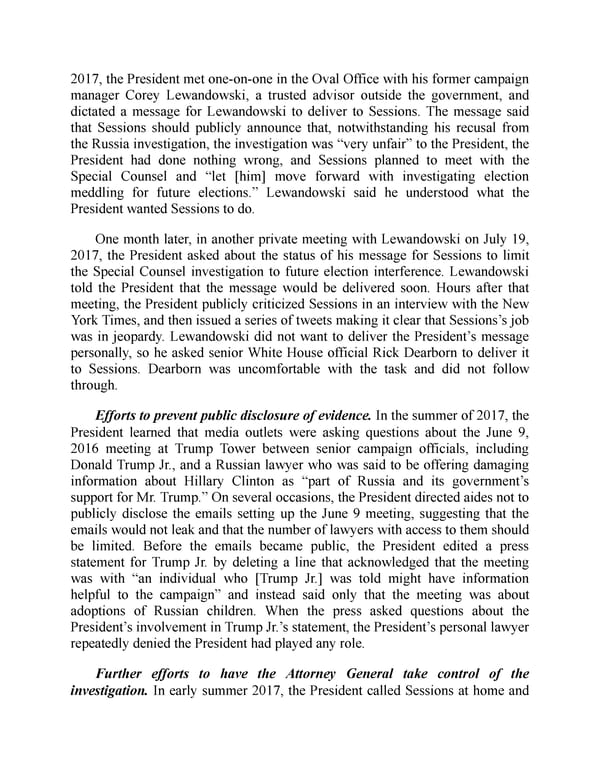2017, the President met one-on-one in the Oval Office with his former campaign manager Corey Lewandowski, a trusted advisor outside the government, and dictated a message for Lewandowski to deliver to Sessions. The message said that Sessions should publicly announce that, notwithstanding his recusal from the Russia investigation, the investigation was “very unfair” to the President, the President had done nothing wrong, and Sessions planned to meet with the Special Counsel and “let [him] move forward with investigating election meddling for future elections.” Lewandowski said he understood what the President wanted Sessions to do. One month later, in another private meeting with Lewandowski on July 19, 2017, the President asked about the status of his message for Sessions to limit the Special Counsel investigation to future election interference. Lewandowski told the President that the message would be delivered soon. Hours after that meeting, the President publicly criticized Sessions in an interview with the New York Times, and then issued a series of tweets making it clear that Sessions’s job was in jeopardy. Lewandowski did not want to deliver the President’s message personally, so he asked senior White House official Rick Dearborn to deliver it to Sessions. Dearborn was uncomfortable with the task and did not follow through. Efforts to prevent public disclosure of evidence. In the summer of 2017, the President learned that media outlets were asking questions about the June 9, 2016 meeting at Trump Tower between senior campaign officials, including Donald Trump Jr., and a Russian lawyer who was said to be offering damaging information about Hillary Clinton as “part of Russia and its government’s support for Mr. Trump.” On several occasions, the President directed aides not to publicly disclose the emails setting up the June 9 meeting, suggesting that the emails would not leak and that the number of lawyers with access to them should be limited. Before the emails became public, the President edited a press statement for Trump Jr. by deleting a line that acknowledged that the meeting was with “an individual who [Trump Jr.] was told might have information helpful to the campaign” and instead said only that the meeting was about adoptions of Russian children. When the press asked questions about the President’s involvement in Trump Jr.’s statement, the President’s personal lawyer repeatedly denied the President had played any role. Further efforts to have the Attorney General take control of the investigation. In early summer 2017, the President called Sessions at home and
 Mueller Report PDF Page 278 Page 280
Mueller Report PDF Page 278 Page 280